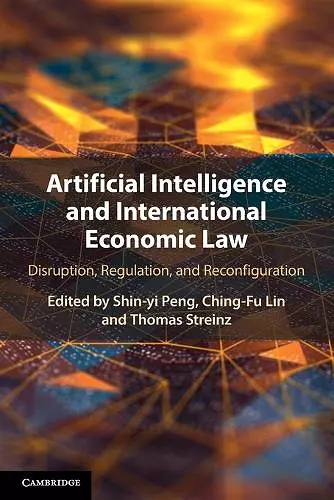Artificial Intelligence and International Economic Law
Disruption, Regulation, and Reconfiguration
Shin-yi Peng editor Ching-Fu Lin editor Thomas Streinz editor
Format:Paperback
Publisher:Cambridge University Press
Published:18th Apr '24
Currently unavailable, and unfortunately no date known when it will be back
This paperback is available in another edition too:
- Hardback£100.00(9781108844932)

Examines the interplay between artificial intelligence and international economic law, and its effects on global economic order. This title is also available as Open Access.
A comprehensive look at the interplay between artificial intelligence and international economic law (IEL), this volume is a valuable guide for scholars, students, practitioners, and policymakers in the fields of IEL, technology law, administrative law, and global AI governance. This title is also available as Open Access on Cambridge Core.Artificial intelligence (AI) technologies are transforming economies, societies, and geopolitics. Enabled by the exponential increase of data that is collected, transmitted, and processed transnationally, these changes have important implications for international economic law (IEL). This volume examines the dynamic interplay between AI and IEL by addressing an array of critical new questions, including: How to conceptualize, categorize, and analyze AI for purposes of IEL? How is AI affecting established concepts and rubrics of IEL? Is there a need to reconfigure IEL, and if so, how? Contributors also respond to other cross-cutting issues, including digital inequality, data protection, algorithms and ethics, the regulation of AI-use cases (autonomous vehicles), and systemic shifts in e-commerce (digital trade) and industrial production (fourth industrial revolution). This title is also available as Open Access on Cambridge Core.
'This book is a must-read for the AI policy community, which has been slow to reckon with the global political economy of AI. The focus on international economic law challenges the dominant conception of what counts as 'AI regulation' to expand beyond concerns of privacy and discrimination, even as it meditates on the potential limits of these regulatory approaches. As the economic drivers of AI and data regulation become increasingly explicit, this collection could not be more timely.' Amba Kak, Director of Global Policy & Programs, New York University AI Now Institute
'As the transformative force of artificial intelligence starts to define the future of our economies and societies, it gives rise to numerous complex legal questions at the international level. This book consolidates contributions that provide an eminently readable treatment of complex issues with a vision into the future of international trade. It offers an excellent point of reference for policymakers, practitioners, and scholars on such a vital subject for our future.' Hamid Mamdouh, Senior Counsel at King & Spalding LLP, former Director of WTO Trade in Services and Investment Division
'The set of technologies included in AI present existential and more ordinary threats, in addition to utopian opportunities. These technologies, and their threats, are global, and will therefore require regulatory coordination among states through international law, and will also challenge settled rules of international economic law. This volume, with exciting and trenchant chapters written by a dream team of authors, illuminates our path to the future.' Joel P. Trachtman, Professor of International Law, The Fletcher School of Law and Diplomacy, Tufts University
ISBN: 9781108949064
Dimensions: 230mm x 150mm x 20mm
Weight: 532g
364 pages